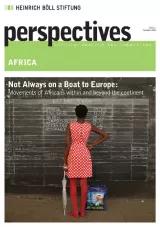Perspectives #02/2018: Not Always on a Boat to Europe: Movements of Africans Within and Beyond the Continent
The current public debate on African migration to Europe is largely fuelled by visions of boats crossing the Mediterranean Sea, filled with esperate people in search of a better life. The narrative positions Africa as a “continent on the move” whose people are surging into Europe on a seemingly endless tide. European politicians propose that Africa must be helped with investment and development aid to reduce the poverty and conflicts that drive Africans from their homes. In the meantime, barbed wire, border patrols and reception camps ought to help manage the situation.
Although media images of desperate African refugees fleeing to Europe do portray the daily reality and the often-tragic consequences of the treacherous crossing, the framing conceals more than it reveals.
Certainly, the number of Africans living in Europe has increased. But, as Asmita Parshotam points out, most African migrants and refugees still move within the region and never leave the continent. For those who do look beyond Africa to improve their lives, Europe is not the only destination. Countries in Asia, the Americas and the Middle East are increasingly important for African migrants.
Oreva Olakpe looks past newspaper headlines of illegal migration and drug trafficking to investigate the fascinating and elaborate community structures developed by Nigerians living in Guangzhou, China. For twenty years, they have been learning to navigate an environment that is economically promising but often socially hostile. Brazil and Argentina are other emerging markets that have become part of the ever-changing geography of African migration. Regis Minvielle chronicles the precariousness of African migrants’ lives as the two countries reconsider the generous immigration policies that were created during their boom years. The Middle East has become another popular – and notorious – destination, particularly for East Africans. In the face of sharp increases in human trafficking, with young women being lured into exploitation by false promises of employment, Rosebell Kagumire calls on the Ugandan government to adopt an effective and victim-centred approach.
On the continent itself, South Africa remains a major destination. However, as Victor Chikalogwe relates, expectations of a safe new home-away-from-home have been dashed for many refugees and asylum seekers. Queer African migrants who come up against the xenophobic and homophobic attitudes that are prevalent in South African society often experience the same kinds of social and economic marginalisation they had hoped to escape in their home countries.
In Kenya, host to one of the largest refugee camps in the world, the United Nations High Commission for Refugees (UNHCR) is seeking to break new ground. In a clear departure from the humanitarian aid approach of the past, a new initiative aims to promote self-reliance among encamped refugees and local host communities alike. This programme is the flagship of Kenya’s rollout of the Comprehensive Refugee Response Framework, which forms part of an emerging United Nations Global Compact on Migration. Although supportive of its ideas, Felicity Okoth is quick to identify a number of policy and political obstacles to its implementation.
Morocco, which will host the intergovernmental conference to adopt the global migration compact in December 2018, is itself evolving from a sending and transition country into a destination for migrants. Souley Mahamadou Laouali charts the country’s efforts to attract students from sub-Saharan Africa to its institutions of higher education, which is part of a campaign to improve its diplomatic relations with the rest of the continent.
Finally, Adaobi Nwaubani and Aly Tandian ask why and how many Nigerians and Senegalese still embark on long and winding journeys through corrupt officials, barbed wire and deadly seas to reach Europe. Their articles untangle a complex web of social, economic and political dynamics at play on a continent where people have higher ambitions and are more mobile than ever before.
We hope that the articles gathered here will help to shed new light on aspects of the movement of African migrants that have remained on the margins of discussion, and to place the pressures experienced in Europe within a broader perspective.
Jochen Luckscheiter
Programme Manager
Layla Al-Zubaidi
Regional Director
